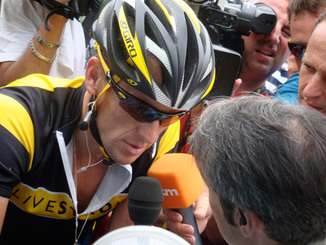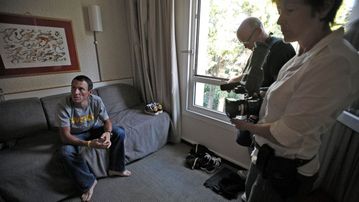So when the story broke that Lance Armstrong was banned from cycling for life and stripped of his seven consecutive Tour de France titles, I suppose I was more incredulous to the allegations against him than most people were. I held out hope, false hope, that it was all an elaborate plot to bring him down, to set an example for the rest of the cycling world that was drowning in performance-enhancers. There was no way he was involved, let alone the evil ringmaster that the authorities were making him out to be. I went in to The Armstrong Lie with a certain amount of those personal reservations intact. And I watched, half dumbfounded, half furious, as everything I thought I knew about the mythic figure of Lance Armstrong was systematically dismantled and destroyed.
To fully appreciate The Armstrong Lie, a little background is in order. Director Alex Gibney, the man behind the critically-acclaimed exposé docs Taxi to the Dark Side and Enron: The Smartest Guys in the Room, originally sought to make a documentary about Lance Armstrong’s triumphant return to the world of cycling with the 2009 Tour de France. He was granted unprecedented access to Armstrong and his team and filmed a great deal of material tracking Armstrong before and during the Tour. Then everything about Lance Armstrong went to shit, so Gibney abandoned the project, which some were calling an unnecessary puff piece. But after the full extent of his cheating was known, Gibney picked the project back up, this time to really, fully explain what Lance Armstrong did. He felt that Armstrong owed him, and the rest of the world, an explanation.
As a result, a lot of the documentary focuses on the actual 2009 Tour, with gorgeous shots of the peloton riding through the Pyrenees and endless fields of sunflowers. Gibney himself acts as the narrator, taking us through Armstrong’s childhood, early career, cancer diagnosis, rise to fame, and subsequent fall from grace. Having him audibly present is necessary given the nature of the project; he discusses how the movie itself morphed over time. He also plays somewhat of an unreliable narrator. On the one hand, he spent a year immersed in Armstrong’s life, and he came to know Armstrong quite well as an athlete and a person. But on the other hand, Armstrong straight-up lied to him for that entire time. The narrative tone might be inconsistent at parts, but that’s only reflective of Gibney’s own dissonant, conflicting views about his subject. Gibney isn’t entirely sure how to process the massive, mythic saga that is the Lance Armstrong story, and as a result, neither are we. And that’s not a bad thing.
The Armstrong Lie plays out less like a two-hour exposé of an evil mastermind and more like an in-depth analysis of not only how he cheated the entire world but why. The film paints Armstrong as an almost Napoleonic figure in his ambition and calculating control of his own story. Armstrong wanted to be viewed as a self-made man, a fearless champion who conquered cancer and the world’s most difficult athletic competition. Deftly balancing new interviews and archival footage, Gibney chronicles Lance’s methodical cheating of the system and the press, using his massive celebrity status to ensure his legacy. Importantly, the film also emphasizes the systematic nature of the use of performance enhancing drugs in cycling. Armstrong was not an isolated incident; the entire sport of professional cycling has become rotten to the core with performance enhancers, as we hear from Lance’s teammates and other experts.
But the most compelling issue the film brings up is the question of why Lance decided to return at all. He had already won a record-shattering seven consecutive Tour titles. He had successfully fooled everybody into thinking he had raced clean, and the voices of dissent against him were largely quiet. So why did he stir up all those accusations again? What else did he have to prove? Was it to silence his critics once and for all? Was it to prove something to himself, that he could really race clean and still be the best? Or was it just sheer hubris? Gibney presents convincing arguments for all of these explanations, and it’s that aspect of the story that has lingered with me long after the credits rolled.
As I walked out of the theater, I felt something I haven’t felt after a movie in a long time. I was angry. I was angry with Armstrong for deceiving the entire world and cheating his way into history. I was angry at the entire sport of cycling for letting itself become so corrupt. But most of all, I was angry with myself, for so eagerly and so completely believing Armstrong's carefully fabricated story when all the clues were right before my eyes the entire time. It’s clear that Alex Gibney is angry too, and his strong feelings towards his subject come across in the final product. The Armstrong Lie was not an easy film for me to sit through because it so completely shook a core foundation of my childhood, but it helped me come to terms with the fact that we were all cheated. We all were duped by the miracle of Lance Armstrong, and The Armstrong Lie is a vital part of the healing process.
Grade: A-


 RSS Feed
RSS Feed
